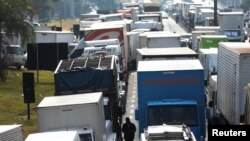A truckers protest over diesel prices in Brazil that is hurting supplies of fuel, food and medicines continued for the sixth day Saturday despite President Michel Temer's order for the military to clear blocked roads the day before.
Major cities declared a state of emergency as gas stations and airports ran out of fuel, supermarket shelves went bare and hospitals said they were running out of supplies.
Public transport and trash collection were reduced or halted across the country, and prices for some food items jumped.
The government said there were fewer blockades on major highways across the country on Saturday compared with Friday.
However, the main entity representing truckers, ABCAM, said it had not changed its position that the protests would be called off only after federal taxes on diesel had been scrapped.
Later Saturday, federal forces and police appeared to be gaining an edge on clearing some roads. They were escorting convoys with fuel and other products in some areas in the country, including the airport in the capital, Brasilia.
Negotiators for several trucker groups initially agreed Thursday to suspend the protests as the government promised to subsidize and stabilize diesel prices, which may cost 5 billion reais ($1.4 billion) this year.
But truckers say they want a definitive solution, and that they will end the protest only when a decision to eliminate federal diesel taxes is published in the official gazette.
Some business sectors that depend on daily supplies were suffering.
Lack of animal feed may cause the deaths of 1 billion birds and 20 million hogs, Brazilian meat group ABPA said, adding that more than 150 poultry and pork processing plants had indefinitely suspended production.
Brazil's sugar industry, the world's largest, is slowly halting cane harvest operations as machines ran out of fuel.
Blockades continue to prevent trucks from entering the port of Santos, Latin America's largest, and oilseeds crushing group Abiove said soy exports would halt Saturday if truckers did not allow access to major ports.
Auto production, which contributes about a quarter of Brazil's industrial output, ground to a halt Friday.
Authorities said even after roads were completely cleared, it would still take several days to normalize supplies.








